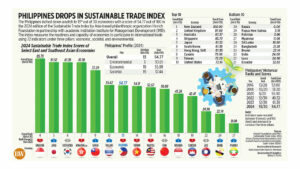Ammunition should be regulated just as strictly as firearms

The Comprehensive Firearms and Ammunition Regulation Act (Republic Act No. 10591), enacted in 2013, provides the legal framework for the ownership, possession, manufacture, importation, and sale of firearms, ammunition, and explosives in the Philippines. The law establishes a rigorous licensing process for firearm owners and sets limits on the quantity of ammunition an individual can possess. Its goal is to balance responsible firearm ownership with public safety, aiming to prevent the spread of illegal firearms.
Senator Ronald “Bato” Dela Rosa introduced Senate Bill No. 2773 on Aug. 24, seeking to amend provisions of the Republic Act 10591. According to Senator Dela Rosa, the proposed changes aim to streamline regulatory procedures, reduce bureaucratic barriers for responsible gun owners, and adjust the allowable quantities of ammunition to better reflect practical needs. However, these amendments raise serious concerns about their potential impact on public safety.
Since the bill’s introduction, it has been referred to the Senate Committee on Public Order and Dangerous Drugs — chaired by Senator Dela Rosa himself — for deliberation. So far, only Senator Miguel Zubiri, a self-confessed pro-gun advocate, has expressed support for the bill, stating that “everyone has the right to defend ourselves from all threats, whether internal or external, and to assist the Philippine National Police and the Armed Forces of the Philippines in times of need.”
Senate Bill 2773’s supporters are primarily from the arms industry. They believe that the bill addresses some of their concerns, such as a provision that exempts the industry from restrictions on transferring weapons during the election “gun ban” period for export purposes. The Philippine National Police has expressed concerns about the increase in the allowable amount of ammunition, warning that it could result in civilians possessing more bullets than law enforcement personnel. Meanwhile, a counterpart bill has not yet been filed in the House of Representatives, making the legislative path uncertain.
Proponents of the bill stress the importance of supporting responsible gun ownership, yet one of its provisions significantly increases the allowable amount of ammunition from 50 to 500 rounds. This raises serious concerns about potential misuse and public safety risks. Expanding access to ammunition without sufficient controls could heighten the risk of severe harm in incidents of gun violence. These proposed amendments appear to prioritize convenience for gun owners over community safety.
However, an important “elephant in the room” is the bill’s proposal to decentralize the authority to issue permits to carry firearms outside of residence. Under current law, this authority lies only with the Chief of the Philippine National Police (PNP). The proposed amendment seeks to expand this to “a duly authorized representative” or the PNP Regional Director or the Chief of the Regional Civil Security Unit (RCSU). While this decentralization could streamline processes, it raises questions about the broader implications. For instance, does this also mean decentralization of the threat assessment of future gun holders, and decentralization of the management of funds generated through the modest revenue of gun licensing fees? Moreover, this change could open the door to inconsistent application of permit issuance across different regions, potentially undermining efforts to maintain strict control over firearms.
The Committee must exert more effort to hear diverse perspectives and invite multiple stakeholders to participate in the hearings, not just the obvious pro-gun supporters. This is critical to ensure a comprehensive review of the bill’s broader societal impacts, rather than focusing narrowly on the convenience of gun owners or industry concerns.
This proposed Senate Bill brings to mind a comedian’s observation: “We don’t need gun control. What we really need is bullet control. Bullets should cost $5,000 apiece.” As humorous as it may seem, this perspective highlights a critical point — bullets, not just guns, are the agents of destruction. Expanding access to ammunition without stringent controls increases risks rather than mitigating them. Even with an improvised firearm like a “sumpak” — a makeshift weapon made from metal pipes — access to ammunition is enough to create a lethal threat. Ammunition, therefore, should be regulated just as strictly as firearms.
The issue of marking and tracing ammunition remains a major challenge in effective arms and ammunition regulation. Current systems depend heavily on ballistic testing, which links ammunition to the firearm from which it was discharged — a time-consuming process that only works if the weapon is recovered, which is often not the case in conflict or crime situations. New technological solutions should be explored to mark and trace ammunition independently of firearms. Innovations such as unique identifiers on ammunition could enable authorities to trace its origin, shipment, and distribution without relying on ballistics tests tied to a specific weapon. This would enhance accountability and provide stronger tools for crime investigation and arms control.
A more balanced approach is needed — one that ensures public safety while offering fair provisions for firearm owners. The regulation of ammunition should be as stringent as the regulation of firearms. This principle aligns with the 2023 Global Framework for Through-Life Conventional Ammunition Management, which the Philippines fully supports. Ongoing efforts, like those of the Technical Working Group led by the Office of the Special Envoy on Transnational Crime, along with other government agencies, on a draft National Action Plan on Small Arms and Light Weapons, provide valuable guidance for such regulations.
Gun violence is a complex problem that requires comprehensive solutions, not just an increase in firepower. Alongside strict background checks and mental health support, we must implement responsible restrictions on both firearms and ammunition. Lawmakers should carefully consider the consequences of relaxing these regulations and whether they are willing to endanger future generations by allowing more ammunition to proliferate unchecked.
Senate Bill 2773 moves in the wrong direction. Rather than enhancing community safety, it risks normalizing a culture of violence by making lethal tools more accessible. We must ask ourselves whether this is the legacy we want to leave for future generations: a society where the convenience of gun owners outweighs the value of life.
I strongly urge lawmakers to reconsider the broader implications of this bill and to prioritize measures that enhance public safety, accountability, and responsibility.
Fred Lubang is a recognized expert on weapons regulation and the recipient of the 2022 Seán MacBride Peace Prize for his unwavering commitment to peace, disarmament, common security, and non-violence, particularly in the face of ongoing conflicts.




